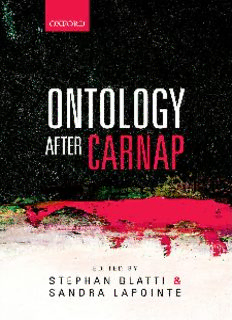
Ontology after Carnap PDF
Preview Ontology after Carnap
Ontology after Carnap Ontology after Carnap edited by Stephan Blatti and Sandra Lapointe 1 3 Great Clarendon Street, Oxford, OX2 6DP, United Kingdom Oxford University Press is a department of the University of Oxford. It furthers the University’s objective of excellence in research, scholarship, and education by publishing worldwide. Oxford is a registered trade mark of Oxford University Press in the UK and in certain other countries © the several contributors 2016 The moral rights of the authors have been asserted First Edition published in 2016 Impression: 1 All rights reserved. No part of this publication may be reproduced, stored in a retrieval system, or transmitted, in any form or by any means, without the prior permission in writing of Oxford University Press, or as expressly permitted by law, by licence or under terms agreed with the appropriate reprographics rights organization. Enquiries concerning reproduction outside the scope of the above should be sent to the Rights Department, Oxford University Press, at the address above You must not circulate this work in any other form and you must impose this same condition on any acquirer Published in the United States of America by Oxford University Press 198 Madison Avenue, New York, NY 10016, United States of America British Library Cataloguing in Publication Data Data available Library of Congress Control Number: 2015944571 ISBN 978–0–19–966198–5 Printed in Great Britain by Clays Ltd, St Ives plc Links to third party websites are provided by Oxford in good faith and for information only. Oxford disclaims any responsibility for the materials contained in any third party website referenced in this work. Contents Notes on Contributors vii Introduction 1 Stephan Blatti and Sandra Lapointe 1. Carnap’s Big Idea 13 Thomas Hofweber 2. Three Carnaps on Ontology 31 Robert Kraut 3. Frameworks and Deflation in “Empiricism, Semantics, and Ontology” and Recent Metametaphysics 59 Alan Sidelle 4. Carnap, the Necessary A Posteriori, and Metaphysical Anti-realism 81 Stephen Biggs and Jessica Wilson 5. Three Degrees of Carnapian Tolerance 105 Eli Hirsch 6. Carnap and the Prospects for Easy Ontology 122 Amie Thomasson 7. Much Ado about Something-from-Nothing; or, Problems for Ontological Minimalism 145 Simon Evnine 8. Carnap’s Legacy for the Contemporary Metaontological Debate 165 Matti Eklund 9. Carnap and Ontology: Foreign Travel and Domestic Understanding 190 Richard Creath 10. Carnap on Abstract and Theoretical Entities 200 Gregory Lavers 11. Questions of Ontology 220 Kathrin Koslicki Index 243 Notes on Contributors Stephen Biggs, Iowa State University Stephan Blatti, University of Memphis Richard Creath, Arizona State University Matti Eklund, Uppsala University Simon Evnine, University of Miami Eli Hirsch, Brandeis University Thomas Hofweber, University of North Carolina, Chapel Hill Kathrin Koslicki, University of Alberta Robert Kraut, Ohio State University Sandra Lapointe, McMaster University Gregory Lavers, Concordia University Alan Sidelle, University of Wisconsin Amie Thomasson, University of Miami Jessica Wilson, University of Toronto Introduction Stephan Blatti and Sandra Lapointe Metaphysics incorporates two levels of inquiry: ontology and metaontology.1 In the first, questions about what exists and about the properties and relations of various existents are posed and answered. The array of entities whose existence and properties are of concern ranges from the more familiar objects of everyday life, such as tables and persons, to the more exotic realms of numbers, fictional characters, propositions, and possible worlds. Given the enormous variety of things concerned, the questions ontol- ogists address often remain highly general. Ontological questions may concern, for example, what exists, what sort of stuff makes up those entities that do exist, in what kinds of relations existents stand with one another, the categories of existents, etc. Metaontology takes as its subject ontology itself. One may ask how, for instance, are ontological questions to be understood, and what really is at stake in raising and attempting to answer them? Or one may wonder by what standard are we to decide between competing answers to these questions? Or whether there are beliefs, state- ments, and/or practices that reveal antecedent commitments regarding answers to ontological questions (or antecedent constraints on the range of tenable answers)? While most, if not all, significant figures in the history of western metaphysics have held at least tacit views concerning these metaontological questions, careful and sustained work in metaontology is a relatively recent phenomenon.2 The single most significant episode in the brief history of metaontological inquiry was the mid-twentieth-century debate between the leading exponent of the logical positivist movement, Rudolf Carnap (1891–1970), and the leading critic of that movement, Willard Van Orman Quine (1908–2000).3 The subject of their dispute was the nature 1 The question of the relation between metaphysics and ontology is not altogether unproblematic. Some of the essays included here (see Koslicki infra, Hofweber infra, Sidelle infra) offer a discussion of these issues. 2 Notwithstanding a few prior instances, regular use of the term ‘metaontology’ appears to date back no further than Peter van Inwagen’s 1998 article titled simply “Meta-ontology,” though even he had some reservations about the term’s introduction (249 n1). (See also Koslinski infra.) 3 Though preceded and succeeded by other relevant publications (see Quine 1951b and 1960, Carnap 1956, Appendix D and Creath 1990), the primary moves in this debate were made in quick succession in Quine’s “On What There Is” in 1948, Carnap’s “Empiricism, Semantics, and Ontology” in 1950, and Quine’s
Description: